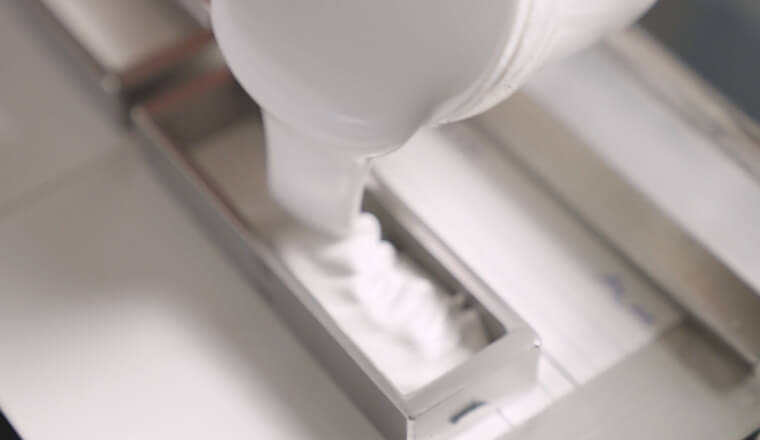In the fast-paced world of coatings, adhesives, and sealants (CAS), companies are grappling with a multitude of challenges. The traditional demands to respond swiftly to customer needs and balance performance with cost remain crucial. But now, sustainability goals have been added to the mix, creating an even more complex landscape. On top of this, new regulations prohibiting the use of problematic ingredients are coming into effect, and experienced formulators are nearing retirement. To stay competitive, there’s a pressing need to accelerate research and development (R&D) and utilize better tools for finding substitute ingredients, optimizing multiple objectives, and transferring knowledge to new employees. Enter AI platforms, tailored specifically for companies where chemistry is a strategic advantage. Let’s explore how AI is addressing these challenges through some real-world examples.
Optimizing Multiple Objectives Quickly
A leading global construction materials and chemicals company faced the challenge of optimizing a multi-layer coating to enhance stability while maintaining its mechanical and functional properties. By leveraging Citrine’s AI platform, they modeled each layer of the coating and its overall properties. Their subject matter experts trained the AI with the necessary context and property relationships, leading to rapid and successful results. Remarkably, the customer estimated a more than 50% reduction in development time.
Finding Substitute Ingredients
A top global adhesives and sealants company needed to maintain its innovation edge while adhering to new PFAS regulations and shifting market demands. Their goal was to reformulate a pressure-sensitive adhesive to exclude PFAS without compromising performance—a project initially estimated to take five years. By using the Citrine Platform, they created a model within three months to screen small molecules and assess millions of ingredient combinations. This led to the identification of 30 viable candidates. Within just four months, they pinpointed a breakthrough candidate, reducing the projected time to market from five years to two—2.5 times faster than originally planned.
Case study:
Removing PFAS From Adhesives
Rapidly Responding to Customers
Dorfner, a family-owned company founded in 1895 and a leading European industrial and specialty minerals supplier, has seen remarkable revenue growth by strategically employing AI. The past few years have brought significant challenges, including the pandemic, logistical issues, and rising energy costs. By revolutionizing its formulation process with AI, Dorfner accelerated paint formulation optimization, new raw material development, and sustainable practices. This reduced formulation development time from six months to one month, allowing the company to meet customer requirements with unprecedented precision and speed. Additionally, they could adapt formulations for new regions while maintaining quality and consistency with local raw materials, thus opening new markets outside Europe.
Transferring Knowledge to New Employees
As experienced product experts use Citrine’s AI platform, they create reusable assets that new employees can review, learn from, and adapt. Reviewing the data uploaded into the platform shows which properties experts deemed important and which experiments have already been conducted. AI models incorporate critical raw material properties and processing parameters. This information is graphically mapped to the relevant final material properties, making it easier for future users to understand causal relationships in their material systems. Search spaces restrict ingredients and processing parameters to feasible values, serving as a safe starting point for future projects. Once datasets, AI models, and search spaces are established, they can be reused for different property targets, facilitating knowledge transfer and innovation.
Getting Data Ready for AI
Contrary to popular belief, you might need less data than you think. While big data AI, like ChatGPT, requires extensive datasets, small data AI such as that developed by Citrine, can start with as few as 20 data points. AI looks for patterns in cause and effect, requiring detailed and accurate information on inputs (materials and processing history) and outputs (final product properties). It’s crucial to have sample IDs that match preparation with test results. The more detail recorded—such as ingredient amounts and processing parameters—the better. Consistent measurement standards and excluding typos or badly calibrated measurements are also essential. Lastly, AI learns more from a dozen data points spanning the whole search space than 100 data points in one area. Make sure your data is both diverse and high quality.
Summary
The CAS industry is at a crossroads where traditional challenges intersect with new sustainability and regulatory demands. The integration of AI platforms offers a strategic advantage by accelerating R&D, optimizing formulations, and preserving critical knowledge. As the industry continues to evolve, the adoption of AI will be instrumental in enabling companies to adapt swiftly and maintain their competitive edge.
Contact us to learn more and benefit from Citrine’s extensive experience in this area.
Register for a webinar where we show you how all this works.

